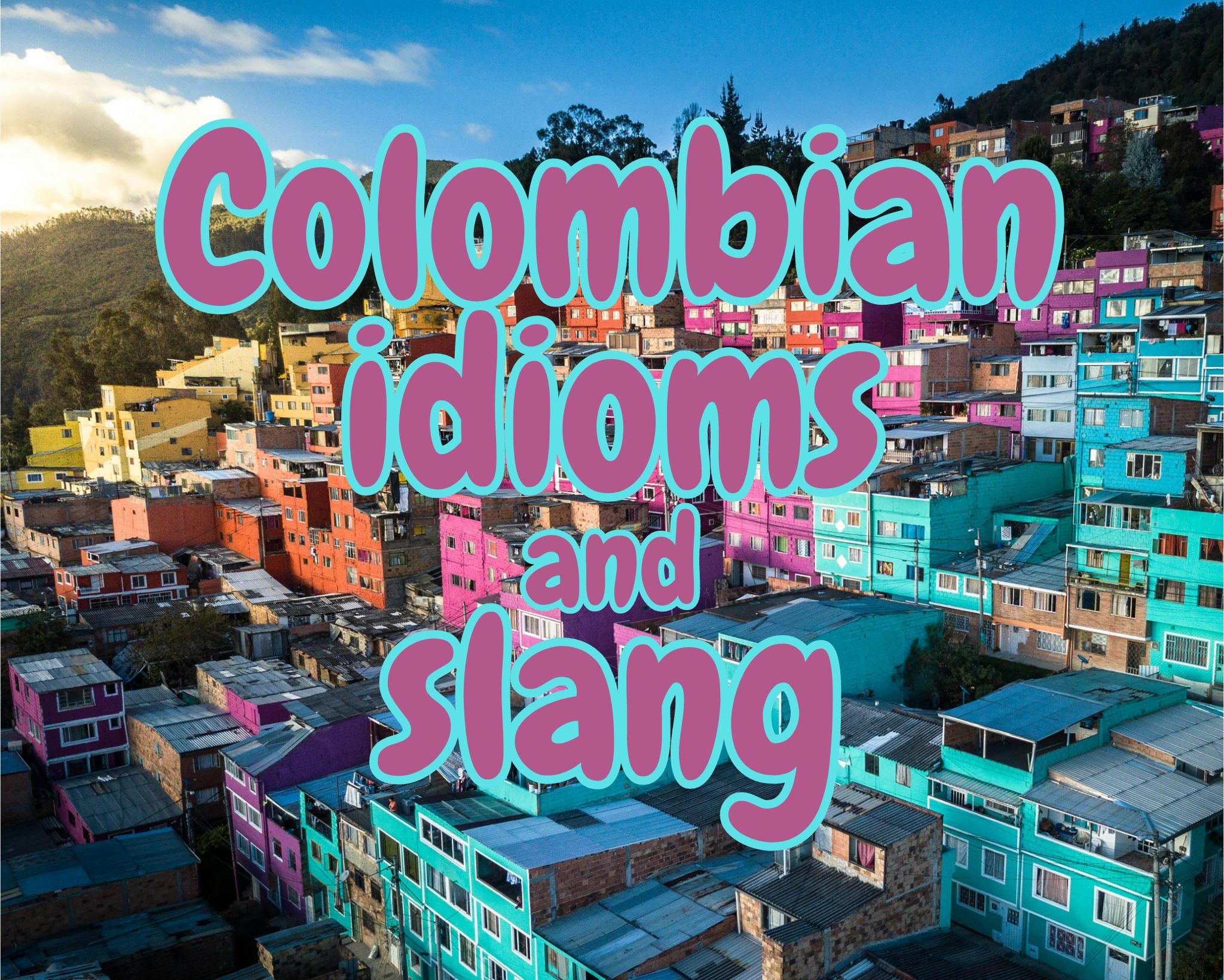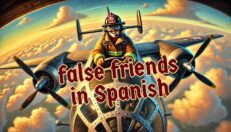Colombian Slang: 38 Colombian idioms to speak like a local

Get our free email course, Shortcut to Conversational.
Have conversations faster, understand people when they speak fast, and other tested tips to learn faster.
More infoAre you planning a trip to Colombia? ¡Qué buena idea! So why not get acquainted with some of the unique Colombian slang terms before you go?
Colombia is not only known for its breathtaking landscapes, vibrant culture, and warm people, but also for its colorful language filled with unique idioms and expressions. If you want to immerse yourself in Colombian culture and truly connect with locals, learning some Colombian slang is essential.
In this post from LearnSpanishWithJames, we’ll explore some of the Colombian idioms you’ll hear from native speakers, along with some example sentences to help you understand how to use these phrases in context.
Colombian slang expressions for social interactions
1. Rumbear
Rumbear in Colombian Spanish means to party or to have a good time. It refers to engaging in activities related to nightlife or celebration. It’s the verb form of the Colombian slang for a party, which is una rumba.
- Nuestros primos vienen a la ciudad este fin de semana y nos vamos a rumbear. – Our cousins are coming to town this weekend and we’re gonna party.
2. Caer
Literal meaning: To fall
Slang meaning: To hit on someone, To flirt
Caer, literally meaning to fall, can be used colloquially as me está cayendo to indicate someone is flirting with me, or le estoy cayendo, indicating I am flirting with him or her.
- Mira, ese es el chico que me está cayendo. – Look, that’s the guy who hit on me.
3. Gallinacear
Literal meaning: To hen
Slang meaning: To flirt, To seek romantic conquests
In Spanish, una gallina is a chicken or a hen. This has become a verb in Colombian slang: gallinacear is used for trying to hit on women or make romantic conquests.
- Él se va a gallinacear cada fin de semana. – He goes out to find women every weekend.
4. Camellar
Literal meaning: To camel
Slang meaning: To work hard
The Spanish word for a camel is un camello. In Colombian slang, we use un camello to refer to a job. This word has also become a verb, so camellar is a slang term for working hard.
- Mi papá necesita camellar toda la semana para mantener a nuestra familia. – My dad needs to work hard all week to support our family.
5. Embarrar
Literal meaning: To smear
Slang meaning: To mess up, To ruin, To screw up
When something goes wrong or gets messed up, people from Colombia use embarrar to describe the situation.
- ¡La embarré! – I messed it up!
6. Cuadrar
Literal meaning: To square up
Slang meaning: To arrange a meeting, To organize, To schedule a date, To plan, To coordinate
This Colombian slang term can be used in many contexts to talk about getting things organized or planned out.
- Cuadremos algo para mañana. – Let’s plan something for tomorrow.
7. Poner los cachos
Literal meaning: To put horns on
Slang meaning: To cheat on someone
The Colombian idiom poner los cachos literally means to put horns on someone. It’s used to talk about infidelity in relationships, where the cheater “puts horns on” the other person.
- Pedro descubrió que Paula le está poniendo los cachos. – Pedro found out that Paula is cheating on him.
8. Achantarse
Literal meaning: To back down
Slang meaning: To be ashamed, To feel embarrassed
- No me digas que se achantó porque se me declaró. – Don’t tell me he felt embarrassed because he told me that he loved me.
Colombian slang expressions for states or conditions
9. Estar enguayabado
Literal meaning: To be stuck in the guava tree
Slang meaning: To be hung over
- Ayer salimos con mis compañeros del trabajo. Estoy super enguayabado. – Yesterday I went out with some colleagues. I’m so hung over!
10. Estar prendido/a
Literal meaning: To be lit
Slang meaning: To be buzzed, To be tipsy
The Spanish verb prender means to light, whether for a fire or a light, so its past participle prendido means lit. In Colombian slang, we use estar prendido or estar prendida to describe when someone is tipsy from a couple of drinks. It can also describe when someone is stoned from smoking a joint. Either way, when someone está prendido, it’s a relatively mild intoxication.
- ¡Me tomé dos tragos y ya estoy prendido! – I’ve drunk two cocktails and I’m already buzzed!
11. Estar jincho/a
Literal meaning: To be ignorant
Slang meaning: To be drunk
Estar jincho is typical Colombian slang, and it means to be drunk.
- Ya estás todo jincho. – You are already drunk.
12. Foquiado/a
Slang meaning: Passed out, Knocked out
There is no literal meaning for this one but it basically means to be passed out.
- Ella está foquiada y sigue durmiendo. – She is passed out and she’s still sleeping.
13. Estar mamando gallo
Literal meaning: To be sucking rooster
Slang meaning: To be joking, To be kidding around
Colombians love to joke around, and mamar gallo is their way of saying someone is pulling your leg or joking with you.
- ¡Deje de mamarme gallo! – Stop pulling my leg!
14. Estar tragado/a
Literal meaning: To be swallowed (by someone)
Slang meaning: To be head over heels in love
- Ella se tragó. – She’s got me love struck. – She’s got me head over heels.
Colombian slang exclamations
15. ¡Qué rumba!
We saw rumba in our entry on rumbear, with una rumba meaning a party. So what is ¡qué rumba! in Colombian Spanish? It’s an expression used to ask about or express excitement for a party or some other fun event. You can use it when talking to a Colombian friend to say what a party! or what fun!.
- El desfile de Carnaval fue increíble. ¡Qué rumba! – The Carnival parade was amazing. What a party!
16. ¡Qué chimba!
Literal meaning: How cool!
As expected, there are various slang words in Colombia and other Spanish-speaking countries for the English equivalent of cool.
- ¡Me gané dos entradas para el concierto de mi banda favorita! ¡Qué chimba! – I won two tickets to my favorite band’s concert! How cool!
17. ¡Qué berraquera!
Literal meaning: Fantastic!, Unbelievable!
Depending on the context, this expression can be used in a positive or negative way.
- ¿Te vas para Nueva York? ¡Qué berraquera! – ¿Are you going to New York? Fantastic!
- Este es el quinto paro de la semana. ¡Qué berraquera! – This is the fifth strike of the week. Unbelievable!
18. ¡Es una nota!
Literal meaning: It’s a note!
Slang meaning: It’s awesome!, It’s really good!
- Ella es una nota bailando. – She’s awesome at dancing.
19. ¡Qué oso!
Literal meaning: How bear!
Slang meaning: How embarrassing!
If you know your Spanish animal words, you may recognize that un oso is a bear in Spanish. So in the literal sense, how bear! is Colombian slang for how embarrassing!
- Él llegó borracho a la reunión. ¡Qué oso! – He arrived drunk to the meeting. How embarrassing!
20. ¡Qué boleta!
Literal meaning: How ticket!
Slang meaning: How embarrassing!
Una boleta in Spanish is a ticket, whether for an event or for a train or bus. In the Colombian slang exclamation ¡qué boleta!, however, the meaning becomes how embarrassing!
- Luis llegó al funeral justo cuando éste terminaba. ¡Qué boleta! – Luis arrived to the funeral just as it was ending. How embarrassing!
21. ¡Qué embarrada!
Literal meaning: What a pity!
Similar to the meaning of the verb embarrar that we saw above, Colombians use the expression ¡qué embarrada! when they want to express disappointment or regret about something.
- Mario perdió su trabajo. ¡Qué embarrada! – Mario lost his job. What a pity!
22. ¡Qué vaina!
Literal meaning: What a pod!
Slang meaning: What a pity!
In the literal sense, una vaina is a pod, like for peas or beans. We use the same word for a sheath or a scabbard, for a blade.
In Colombian slang, however, we use qué vaina idiomatically to express a lament when there’s a problem, or when something bad happens. Translations can vary, from what a pity to that sucks.
- Ayer me robaron la cartera. / ¡Qué vaina! – My wallet got stolen yesterday. / That sucks!
On its own, the word vaina is also used as a broad term to say a thing.
- Hazme el favor y pásame esa vaina. – Do me a favor and pass me that thing please.
23. ¡Qué jartera!
Slang meaning: What a pain in the butt!, How boring!
- ¡Qué jartera esta fiesta! – This party is so boring!
24. ¡Qué gonorrea!
Literal meaning: What gonorrhea!
Slang meaning: Damn, Motherfucker
Like chimba, this expression means different things depending on the context. In Colombian slang, something or someone can literally be a gonorrhea. ¡Qué gonorrea! can either be a negative or positive remark.
This is one of the funny and peculiar Colombian idioms. It’s used often, so don’t be surprised when you hear the word gonorrhea thrown around! Still, it’s best to only use it around close friends and family.
- Mira a este gonorrea. – Look at this dude. – Look at this jerk.
- ¡Qué gonorrea de película! – That movie sucks!
25. ¡Paila!
Literal meaning: A frying pan
Slang meaning: Too bad!, Screwed
- Quería comprar boletos para el concierto, pero cuando llegué a la taquilla ya estaban agotados, así que paila. – I wanted to buy tickets for the concert, but when I got to the ticket booth they were already sold out, so I’m screwed
Colombian slang for bodily functions or hygiene
26. Tener pecueca
Literal meaning: To have hoof
Slang meaning: To have stinky feet
Pecueca means hoof. In Colombian slang, pecueca also means stinky feet. So in combination with the verb tener, we have the expression tener pecueca.
- Juan tiene pecueca. – Juan has stinky feet.
27. Chucha
Slang meaning: Bad body odor
Chucha is a funny one, with different meanings in other Spanish-speaking countries of Latin America. In Ecuador chucha is a curse word, so be careful when and how you say it. In Colombian Spanish, it’s just bad body odor.
- Tienes mala chucha. – You have bad B.O.
28. Un bollo
Literal meaning: A bun (of bread), A special type of steamed roll
Slang meaning: A turd
Colombians often use un bollo to refer to a piece of turd.
- ¡Pisé un bollo! – I stepped on a piece of poop!
29. Hacer chichí
Slang meaning: To pee
Chichí might ring familiar to other Spanish speakers because it’s a common Colombian slang term for saying pee pee.
- Necesito hacer chichí. – I need to wee.
30. ¡Fúchile!
Literal meaning: Eww, Yuck
Fúchile is used as an exclamation to express a reaction to bad smells. It doesn’t make sense to shout fúchile when looking at something physically gross; it’s only for gross smells.
- ¡Fuchile! Huele a orina de gato. – Eww, it smells like cat urine.
Warning expressions in Colombian slang
31. ¡Estar moscas!
Literal meaning: To be flies, To be like flies
Slang meaning: Be alert!
- Este lugar está muy lleno, hay que estar moscas. – This place is really crowded, so you need to be alert!
32. ¡Pilas!
Literal meaning: Batteries
Slang meaning: Keep your eyes peeled!
Just like estar moscas, estar pilas means to be sharp and alert.
- Cuando caminábamos por el centro, mi amigo me dijo “¡Pilas con el hueco!” para que no tropezara. – When we were walking downtown, my friend said “Watch out for the hole” so I wouldn’t trip.
- Antes de salir de la casa, su madre le dijo: “Pilas esta noche, ¿no?” – Before leaving the house, his mother said, “Pay attention tonight, okay?”
33. ¡Ábrase!
Literal meaning: To open up
Slang meaning: To leave, To scatter, To get out
There are different ways to use this expression. As a simple reflexive verb, it can be used to describe when someone gets going, takes off, or takes one’s leave. As an exclamatory command, ¡ábrase! is used to tell someone to leave or get lost.
- Bueno pues, me abro. – Alright well, I’m leaving.
- ¡Ábrase! – Leave!
34. Dar papaya
Literal meaning: To give papaya
Slang meaning: To ask for it
A papaya is a common South American fruit, but in Colombia it can refer to anything that is of value to you. Dar is the Spanish verb for to give, so we use dar papaya to describe when someone appears careless with their valuables to the point that they’re inviting someone to take them. So your watch, your phone, and your wallet can all be papayas!
- Si no quieres que te roben en la calle, escóndelos y no des papaya. – If you don’t want to get robbed on the street, hide them, and don’t ask for it.
Colombian slang for people
35. Chino
Literal meaning: A Chinese person
Slang meaning: Child
Chinos is the Colombian way to say hijos, which is kids in Spanish.
- Mis chinos siempre se comportan mal. – My kids are always misbehaving.
36. Los tombos
Slang meaning: The police
Los tombos is a typical Colombian slang term for the cops.
- Ya vienen los tombos. – The cops are coming.
37. Ser sapo
Literal meaning: Тo be a toad
Slang meaning: To be a snitch
Although the literal translation is to be a toad, this phrase is used to say someone is a snitch.
- ¿Por qué le dijiste a mamá? No sea tan sapo. – Why did you tell mom? Don’t be such a snitch.
38. El parche
Literal meaning: The patch
Slang meaning: Posse, Friend group, Peeps
El parche in Colombian Spanish refers to a close group of friends who often hang out together.
- El sábado estaremos en el parque con el parche. – On Saturday we’ll be at the park with our peeps.
Conclusion: Colombian idioms and slang
Now that you’re equipped with these Colombian idioms that native Spanish speakers in the region use, you’re ready to dive headfirst into Colombian culture and language! Go ahead and impress your Colombian friends with your knowledge of their local expressions.
¡Buena suerte y que la pases de maravilla en Colombia! – Good luck, and have a wonderful visit in Colombia!



